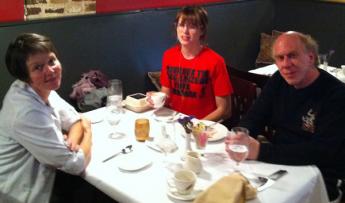Antiquarian Booksellers' Association of America Lorne W. Bair
Why You Collect? Why I Collect. Why I Oughta A Day With Comic Art Collector Warren Bernard

By Lorne Bair
I spent a very pleasant day Friday with my old friend and long-time customer Warren Bernard (that’s him up there…on the right). He’d gotten wind of a stack of The Masses and The Liberator I’d recently acquired and, as is his wont, made the Hadj to Winchester to be sure he got first pick. Over lunch we got to talking about the circumstances that first turned us into collectors and, from there, the nature of collecting and connoisseurship in general. As a counterpoint we had for company my wife, Lee Ann, and my assistant Jordan de Butts - neither of whom has been blessed (or cursed, depending on your point of view) with the collecting gene. It made for an interesting conversation, spurred along by Warren’s passionate - and I mean passionate – devotion to his subject.
Warren is one of America’s foremost collectors of comic art, political cartooning, and caricature. As a scholar-volunteer at the Library of Congress he’s catalogued more than 800 original cartoons, and he’s probably the most knowledgeable collector and scholar of the work of 20th-century American political cartoonist Herb Block (aka “Herblock”) - a subject on which he’s recently delivered two lectures at the Library of Congress . His enormous collection extends as far back as the early 19th century and includes not just political caricature but comic strips, graphic novels, and comic books as well. Where Warren’s interests and mine overlap, naturally, is the strikingly visual realm of radical cartooning which had its heyday from around the 1890s through the Great Depression. Its exemplars include, first and foremost (from my humble point of view, at least), the Unholy Trinity: Art Young, William Gropper, and Hugo Gellert, along with such important but less prolific practitioners as Robert Minor (a brilliant cartoonist whose career was cut short by his slavish devotion to the Communist Party); John Sloan (only a small portion of whose work can properly be described as “radical”); Boardman Robinson, Fred Ellis, Stuart Davis (yes, Davis’s early career included many illustrations for The Masses and other left-wing publications), and others. Needless to say, Warren’s collection includes healthy accumulations of work by each of these artists, and many more besides. Much but by no means all of it he has acquired from me over the years, and I’m happy to say that in the course of that time we’ve succeeded in bridging the dealer-customer gap to become friends and mutual (mutual, I think) admirers.
In any case, Warren and I, in the course of discussing the origins of our mutual collecting passions, stumbled onto the fact that we were both exposed at an early age to the concept of ‘rarity’ - in his case, through a numismatic uncle; in mine, through my father, whose many preoccupations included birding (always on the lookout for the elusive Painted Bunting or Scarlet Tanager); trains (my childhood included countless pilgrimages to abandoned depots in hundreds of little forgotten railroad towns whose spirits had departed with the invention of the automobile…if one of these towns still had an old station house, my father could unfailingly detect it beneath the veneer of fifty years’ worth of renovations); and music (not just any music- but always the most primitive, obscure, forgotten music imaginable, always just barely listenable through the hissing and popping of old 78 records). I’m convinced that this preoccupation with ‘rarity,’ with seeing, touching or hearing something that very few others have ever seen, heard, or touched, is at the root of a great deal of human behavior, at least in its bizarrer aspects. It is what motivates the collector, certainly; but it’s also what puts people in line a 3 a.m. in order to buy the first iPhone in Dubuque, and inspires others to lower themselves into active volcanoes. Collecting, in other words, is simply one expression of what I suspect is a universal, or near-universal impulse for discovery and self-definition.
I’m curious to hear from readers about how, or whether, the concept of ‘rarity’ entered your lives, and how it has expressed itself. Have you become, like Warren, a passionate collector of some obscure and wonderful class of object? Or, like me, become a dealer - that is, someone with all of the instincts, but none of the patience, of a collector? Or were you that guy out in the Best Buy parking lot at 3 in the morning? And how have other circumstances in your life - relative wealth or poverty; marriage and children; career, religion, race, politics, sexual orientation - how do you reckon these have informed your collecting (or non-collecting) habits?
The article is published in Minivan of the Revolution. Pages From the Career of a Not-So-Radical Bookseller. It is presented here by permission of the author.
